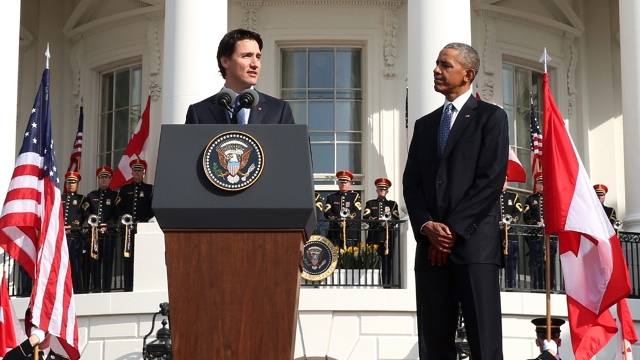
Shock Trump victory casts shadow over green movement, Canadian cleantech
by Cleantech Canada Staff

Donald Trump has called global warming a "hoax," vowed to shred Obama's climate policies and championed unfettered production of coal, oil and gas

The climate policies of U.S. president Barack Obama and Canadian Prime Minister Justin Trudeau advanced largely in tandem over the past year. Donald Trump’s election could stall cooperation between Ottawa and Washington. PHOTO: Government of Canada
OTTAWA—A marathon American election cycle filled with huge momentum swings, unprecedented partisan rhetoric and the meteoric, if inexplicable, rise of more than one political heavyweight had one more massive shock few observers saw coming.
Pollsters sat comfortably in Democratic nominee Hillary Clinton’s camp as results began filtering in the early evening Nov. 8, but by midnight, tight swing state margins fueled a growing acceptance that her opponent seemed poised to pull off perhaps the greatest U.S. political upset in nearly 70 years.
Called early morning Nov. 9, Republican Donald Trump will become the next president of the United States—prompting serious questions about what a Trump presidency will mean for worldwide clean energy momentum, the Paris climate accord and Canada-U.S. relations.
The broader view: Uncertainty abounds after landmark Trump election victory
Prime Minister Justin Trudeau, who remained largely on the sidelines throughout the nearly two-year campaign south of the border, congratulated Trump Wednesday morning.
“Canada has no closer friend, partner, and ally than the United States,” Trudeau said in a statement. “We look forward to working very closely with President-elect Trump, his administration, and with the United States Congress in the years ahead, including on issues such as trade, investment, and international peace and security.”
Still, there is little question Canada and the U.S. will have a range of issues to sort through when the president-elect takes office in late January.
New and old trade deals, such as the Trans-Pacific Partnership and NAFTA, which Trump attacked throughout the campaign will be top-of-mind, with policy makers waiting to see if the boisterous candidate will take a more conciliatory tone after a resounding election victory.
Similarly, Trump has vowed to shred President Barack Obama’s environmental policies and referred to global warming as a “hoax.” Environmentalists and climate scientists are wondering if under his leadership the U.S. will again refuse to enact an international climate treaty, as it did with the Kyoto Protocol in 1997.
With Trudeau having introduced a nationwide carbon price earlier this year and Parliament recently backing the Paris climate accord, Fen Hampson, the head of the global security program at the Centre for International Governance Innovation in Waterloo, Ont., said the opposing views put Canada and the U.S. on “a collision course” on climate change.
Pointing to Trump’s climate policies, Green party Leader Elizabeth May said the election’s result is “clearly horrific.”
Along with pledging to undo Obama’s Clean Power Plan, Trump was a consistent champion of the fossil fuel industry throughout primary season and the general election. He has vowed to save the coal industry as well as scale back regulations in the oil and gas sector—including reversing Obama’s veto of the Keystone XL pipeline.
In Toronto, the S&P/TSX Clean Technology Index opened lower this morning, while both the broader S&P/TSX in Toronto and the Dow in New York opened flat before rallying to a small gain at midday.
As the dust settles, Canadian legislators and cleantech companies will need to wait and see which of candidate Trump’s policies President Trump will bring with him to the White House.
—With files from Joanna Smith, Mike Blanchfield of The Canadian Press as well as Karl Ritter of The Associated Press